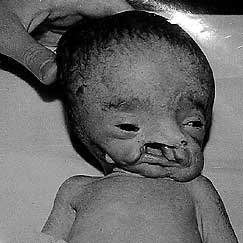IRAQ: Doctors warn of increasing deformities in newborn babies
 BAGHDAD, 27 April (IRIN) - Doctors in
the Iraqi capital, Baghdad, have reported a significant increase in
deformities among newborn babies.
BAGHDAD, 27 April (IRIN) - Doctors in
the Iraqi capital, Baghdad, have reported a significant increase in
deformities among newborn babies.
Health officials and scientists said this could be due to radiation passed through mothers following years of conflict in the country.
The most affected regions are in the south of the country, particularly Basra and Najaf, according to experts. Weaponry used during the Gulf war in 1991 contained depleted uranium, which could be a primary source for the increase, scientists in Baghdad said.
"In my experiments we have found some cases where the mother or father were suffering from pollution from weapons used in the south and we believe that it is affecting newborn babies in the country," Dr Ibraheem al-Jabouri, a scientist at Baghdad University, told IRIN.
According to Dr Nawar Ali, at the University of Baghdad, who works in the newborn babies research department, a significant number of cases of deformed babies had been reported since 2003.
"There have been 650 cases in total since August 2003 reported in government hospitals - that is a 20 percent increase from the previous regime. Private hospitals were not included in the study, so the number could be higher," Ali warned.
The health expert said polluted water, which could contain radiation from weapons used in previous conflicts, was the main factor behind the increase.
The type of deformities found in newborn babies are characterised by multiple fingers, unusually large heads, unilateral lips or no arms or legs.
In addition, Dr Lamia'a Amran, a pediatrician at the Iraqi Red Crescent Society (IRCS) hospital in the capital, told IRIN that inter-marriages were also to blame and that most of cases of deformed babies were from poor families in the southern region.
"Most of the women who have deformed babies in our hospital are married to relatives and have no idea that a common blood factor can also cause such problems," Amran added.
The IRCS hospital registers at least four cases of deformities every week. During April this year, 15 cases were reported, according to the hospital spokesman, a number considered high for a short period of time.
However, Amran added that 60 percent of the cases were not related to blood factors, but due to other causes. She explained that after studying family history of couples with deformed babies, they concluded that radiation and pollution were the main causes of the deformity.
But most of the cases reported don't survive for more than a week, doctors said. Nearly 90 percent of such cases at the Central Teaching Hospital for Pediatrics in Baghdad do not survive, according to Wathiq Ibrahim, director of the hospital.
"We have asked for help from the government to make a more profound study on such cases as it is affecting thousands of families," he told IRIN.
"My two children were born with deformities and today I had my third one with the same problem. The doctors say pollution is the cause and now my husband wants to divorce me claiming that I am not capable of bringing healthy children into the world," Fatima Hussein, a 34-year-old patient at the hospital, told IRIN.
The Ministry of Health (MoH) is working on developing a programme to alert mothers to the problem. A MoH senior official told IRIN that studies had been undertaken to discover reasons for deformities occurring and to find solutions fast.
Officials at the World Heath Organization (WHO) have not yet developed any kind of research on the subject, but said they would assist the MoH if requested.
"The Iraqi government should take a lead on this issue and if we are asked to assist we will do it," Fadela Chaib, a spokeswoman for the WHO in Cairo, told IRIN.
"It is a very delicate problem, I have heard about cancer caused by pollution, but deformities in newborn babies is something new and as a result of security issues in the country our staff are outside Iraq, which makes surveying more complicated," she added.
"Our children have started to suffer the effect of years of war and disasters inside Iraq. The wars happened but no one cared about the result it was going to have and today innocent lives are being lost due to pollution and poor information," Firdous al-Abadi, a spokeswomen for the IRCS, told IRIN.
